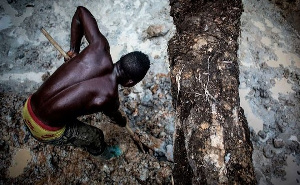Exploration for minerals in Ghana remains hampered by tax burdens, Sulemanu Koney, CEO of the Ghana Chamber of Mines, told The Africa Report.
“We are not happy with the level of investment we see in exploration,” Koney said. Better incentives for exploration are “a major issue”, he said. “That is where we need to focus.”
Koney finds it “worrying” that taxation is front-loaded before commercial finds are made. He questions the VAT liability of inputs used in exploration, which he sees as “not appropriate”. “Exploration is high risk and miners don’t have deep pockets.”
VAT and other taxes should be payable only once commercially viable finds have been made, he says. The Ghana Chamber of Mines says the country is losing potential mining investors to other destinations, particularly Burkina Faso, where exploration does not attract VAT.
Policymakers, Koney says, have been “sympathetic” to lobbying, but nothing concrete has happened yet. He’s “cautiously optimistic” that a solution can be found.
The Ghanaian industry is no longer dominated by mining majors, Koney says. “The industry has changed over the years” and about 40% of the country’s output now comes from small-scale producers, he says.
The challenge is to bring informal activity into formal sector to ensure responsible mining and payment of taxes, he argues. “This needs to be addressed.”
Gold leader
Ghana, Koney says, is likely to extend its lead in gold production over South Africa this year, having become Africa’s largest gold-producing country for the first time in 2019.
It’s too soon to say by how much Ghana’s gold output will rise, but overall mining production in 2020 will be stronger than in 2019, “especially in gold,” he says.
A greater focus on minerals other than gold can help attract greater foreign investment in mining, he said. Ghana has significant reserves of manganese, bauxite, aluminium and iron, but about 97% of its mineral extraction is gold.
Ensuring that geological data is in a format that can be used by mining majors is a key challenge, he says, adding that existing legislation, if properly implemented, would allow greater funding for geological surveys.
“Wherever we can mine responsibly, we should take advantage of that endowment. The investor community is not waiting.”
Uncertain benefits
According to the IMF, Africa has 30% of the world’s mineral reserves and 40% of its gold, but gets only 17% of the worldwide mineral exploration investment.
But tax incentives for mining can be costly according to a working paper from the OECD, leading many countries to forgo revenues in exchange for uncertain benefits.
Before agreeing to tax incentives, governments need to estimate their cost and their impact on investment decisions, the OECD argues.
According to the Gundula Löffler at the UK’s Overseas Development Institute, governments in west Africa need to agree on common policy guidelines around tax incentives and other concessions to mining companies to avoid a “race to the bottom.”
“This will increase transparency in the mining sector, level the playing field between governments, and the extractives industry and prevent multinationals from playing countries off against each other,” Löffler writes.
Bottom Line: Any new Ghanaian tax incentives for miners will be most effective if agreed in coordination with other governments in the region.
Source: theafricareport.com
 Home Of Ghana News Ghana News, Entertainment And More
Home Of Ghana News Ghana News, Entertainment And More





